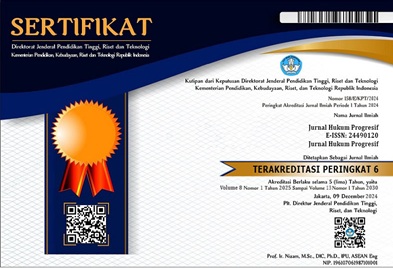PERANAN KEJAKSAAN DALAM MELAKUKAN PENUNTUTAN TERHADAP PERKARA TINDAK PIDANA KORUPSI (STUDI KASUS DI KEJAKSAAN NEGERI BENGKULU SELATAN)
Kata Kunci:
Peranan Kejaksaan, Penuntutan, Tindak Pidana KorupsiAbstrak
Penelitian ini bertujuan untuk mengkaji peran Kejaksaan dalam melakukan penuntutan terhadap tindak pidana korupsi di Kejaksaan Negeri Bengkulu Selatan. Metode penelitian yang digunakan adalah pendekatan empiris dengan pendekatan socio-legal, yang menggabungkan analisis norma hukum dan realitas sosial di lapangan. Data diperoleh melalui wawancara, observasi, serta studi kepustakaan dan data sekunder dari peraturan perundang-undangan dan sumber lain yang relevan. Hasil penelitian menunjukkan bahwa kejaksaan berperan aktif dalam proses penuntutan mulai dari penerimaan berkas penyidikan hingga penyusunan dakwaan dan strategi pembuktian di persidangan. Namun, terdapat hambatan seperti keterbatasan alat bukti, tekanan dari pihak luar, serta keterlambatan hasil audit dari lembaga terkait yang menghambat efektivitas penuntutan. Selain itu, faktor struktural dan budaya di masyarakat turut mempengaruhi proses pemberantasan korupsi. Penelitian ini diharapkan dapat memberikan gambaran yang komprehensif mengenai tantangan dan peran kejaksaan dalam penegakan hukum tindak pidana korupsi di daerah, serta rekomendasi untuk meningkatkan efektivitas proses penuntutan dalam rangka memberantas korupsi secara lebih optimal.
This study aims to examine the role of the Prosecutor's Office in prosecuting corruption crimes at the South Bengkulu District Attorney's Office. The research method used is an empirical approach with a socio-legal approach, which combines analysis of legal norms and social realities in the field. Data were obtained through interviews, observations, and literature studies and secondary data from laws and regulations and other relevant sources. The results show that the Prosecutor's Office plays an active role in the prosecution process, from receiving investigation files to preparing indictments and establishing evidentiary strategies in court. However, obstacles such as limited evidence, external pressure, and delays in audit results from relevant institutions hamper the effectiveness of prosecutions. Furthermore, structural and cultural factors within society also influence the corruption eradication process. This research is expected to provide a comprehensive overview of the challenges and role of the prosecutor's office in enforcing corruption laws in the regions, as well as recommendations for improving the effectiveness of the prosecution process to more optimally eradicate corruption.





